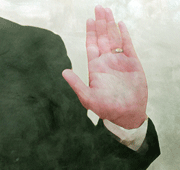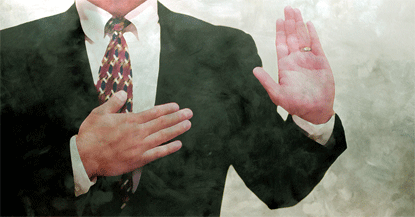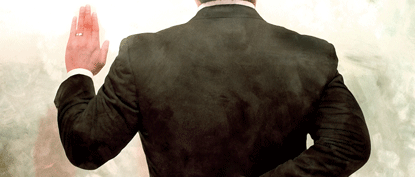
Oct/Nov 2006
SNAPSHOTS OF DISCIPLESHIP
|

|
a free will baptist ethic
by Kevin Riggs
Read more about the world-wide ministry of Free Will Baptists. Visit the denominational website at www.nafwb.org. |
SHE MADE AN APPOINTMENT TO COME BY and talk about the church. When she walked in with her girlfriend I knew the discussion would be far from ordinary. She had been attending faithfully for a few months but had remained on the sidelines. No one knew she was a lesbian. No one knew to ask.
I lovingly explained my thoughts on the Bible and sexuality. I tried to convince her that Jesus (and our church) loved her, but we could not condone her lifestyle. She said she understood, but her tears said otherwise. Her partner was visibly angry and verbally abusive. When they left my office I said to myself, “I bet that’s something my granddad never had to deal with.”
My granddad pastored for decades without ever dealing with issues like same-sex marriage, stem-cell research, human cloning, co-habitation, terrorism, prescription drug addiction, post-modernism, globalization, pluralism, Islamic fundamentalism, blatant anti-Christian attacks from society, internet pornography, and music and sermon piracy over the world-wide-web.
However, Papaw did not have it any easier. He had his own issues. He had to deal with the immorality of the 1960s, evangelical apathy and liberalism, the depression, social problems, World War II, the Korean War, the Vietnam War, Communism, and Watergate. Wow! I guess the more things change the more they remain the same.

Every generation is responsible for contextualizing the Gospel for their generation. And every time this happens, the previous generation gets nervous when they see the upcoming generation tinker with “the way things used to be.” But a quick glance over our history as a denomination shows that every subsequent generation has been faithful to the teachings and traditions of our past. Our denomination has changed, and continues to change, but our denomination has not compromised.
Our denomination has changed, and continues to change, but our denomination has not compromised.
I must confess, I haven’t always seen it that way, and at times I have been involved in generational struggles. I have been guilty of tinkering, and I have been accused of worse. However, I am convinced that one reason our movement has survived change (and will survive change) is because of what I have coined a “Free Will Baptist Ethic.” Our ethic can be seen in our Covenant, but our ethic goes beyond and above our Covenant. In other words, our Covenant came out of our ethics, not the other way around.
Benjamin Randall and Paul Palmer lived by this ethic, as well as my great-grandfather— though they did not categorize it as such. My grandfather followed this ethic in his ministry, and so does my father, and so do I, and so will those who follow me. What, then, is this Free Will Baptist Ethic?
It goes without saying that the Bible guides us as a people. God’s Word is without error, our final authority. Other movements use the Bible as their guide, but Free Will Baptists view life through a conservative understanding and application of Scripture. Our Ethic is built on four pillars that are as relevant today as they have ever been.

The first pillar is holiness. Free Will Baptists have always strived to be consecrated to God and separated from the world. Our brothers and sisters in England (the General Baptists) stood against the Anglican Church because of its worldliness. In America, long before the Civil War, Free Will Baptists stood against slavery. In 1834 and 1835, the Free Will Baptists in New Hampshire, and New York, adopted the following resolutions:
“Resolved, that we will as Christians and Christian ministers, use our influence to promote the doctrine of immediate emancipation, in doing which we wish to treat the oppressor and the oppressed in the spirit of the gospel.”1
“Resolved. That slavery is an unjust infringement on the rights of the slaves; an unwarrantable exercise of power on the part of the master; a potent enemy to the happiness and morals of our slave population; and, if continued, must ultimately result in the ruin of our country.”2
Through the years, in the name of holiness, we have taken a stand against political corruption; against moral issues like abortion and pornography; against neo-orthodoxy, homosexuality, racism, ecumenicalism, Hollywood, and societal moral decay. But we have also taken stands for some things. Through the years, we have stood for inerrancy, creationism, equal rights, civil rights, prayer in school, and traditional family values. Holiness is God’s primary characteristic and our primary ethic.
The second pillar is temperance. Temperance usually refers to total abstinence from the use and sale of intoxicating beverages. Our history is full of resolutions condemning alcohol; and our Covenant reads, “We promise…to abstain…from all sanction of the use and sale of intoxicating beverages.”3 However, in 1957, “temperance” was expanded to include bodily appetites, mental activities, and social activities.4 Too much of a good thing can be bad, and so temperance teaches us to avoid extremes and maintain a balance in all areas of life.
The third pillar is modesty. We believe and practice modesty in dress and in lifestyle. Free Will Baptists believe and teach gender differences should be clear and unquestioned; and nothing a person does or wears should draw undo attention to themselves. Interpretations of modesty vary, but modesty itself is held in high regard among our people and churches.
The final pillar is piety. This word sometimes carries a negative connotation, but we must remember the difference between piety and being pious. Piety refers to devotion to God and diligence in religious practices. To be pious means to practice my piety in such a way that it makes me look good instead of God. Jesus’ story of the Publican and Pharisee illustrate the difference. Our Covenant reads:
“We agree faithfully to discharge our obligations in reference to the study of Scripture, secret prayer, family devotions, and social worship; and by self-denial, faith, and good works endeavor to ‘grow in grace and the knowledge of our Lord and Savior Jesus Christ…we will not forsake the assembling of ourselves together for church conferences, public worship, and the observance of the ordinances of the Gospel; nor fail to pay according to our ability for the support of the church, of its poor, and all its benevolent work.”5
Pastoral ministry has changed drastically since my granddad pastored. The truth is, it has drastically changed since I first started. But the more things change, the more they remain the same.
Over time, issues may change, but the problem of man’s sinful heart will remain the same. But as long as we keep the Bible as our final authority and live by the principles of holiness, temperance, modesty, and piety, we will be able to ride the waves of change while remaining relevant to our culture and true to the Gospel of Jesus Christ.
Dr. Kevin Riggs pastors First FWB Church in Russellville, AR. He welcomes your thoughts and comments. Kevin can be reached at Kevin@firstfreewill.org.
NOTES:
1 1881. The Centennial Record of Freewill Baptists – 1780-1880. Dover, NH: The Printing Establishment (192).
2 Ibid (194).
3 A Treatise of the Faith and Practices of the Original Free Will Baptists. Adopted by the National Association of Free Will Baptists on November 7, 1935, in Nashville, Tennessee.
4 Reports – Temperance Committee, Resolution Committee, 1935-1992. Published in 1993 by the Executive Office of the National Association of Free Will Baptists, Inc. Nashville (13-14).
` 5 A Treatise of the Faith and Practices of the Original Free Will Baptists.
|
|

